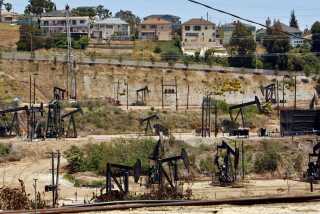Increased Exploration Darkens England’s Golden Belt
- Share via
ALTON, HAMPSHIRE, ENGLAND — What do sleepy, secluded villages and hamlets like Ash, Normandy, Humbly Grove and Dunsfold in the south of England have in common with the wild, wind-swept North Sea?
Answer: oil.
Everybody knows that North Sea oil is what has propelled Britain into the position of the world’s fifth-largest oil producer.
What is not so well known is that oil wells are poping up in a petroleum zone that stretches in a so-called Golden Belt across almost the whole of southern England, from Kent in the east to Devon in the west. The latest and most promising finds are concentrated in Dorset, Hampshire and Surrey.
Like the North Sea
This entire zone contains oil-source rocks similar to those found in the oil-producing areas of the North Sea.
But onshore oil in England is a mere drop in the ocean compared to North Sea oil. According to 1982 figures, Britain extracted some 115 million metric tons from the North Sea in 1983, compared to only 250,000 metric tons from onshore oil. Stark comparisons are misleading, however. North Sea oil is expected to peak in 1985-86. Major oil fields there are already in decline.
This is expected to intensify exploration of oil on land, particularly since the cost of drilling for oil onshore is one-tenth to one-twentieth of the cost of drilling in the North Sea. Drilling in the North Sea calls for extremely expensive rigs that can be anchored to the sea’s deep floor and can withstand its fierce weather.
The main discoveries in the south are British Petroleum’s Wytch Farm in Dorset, Conoco’s Palmers Wood and Baxter’s Copse in Surrey and Sussex, Carless ExploratiOn’s Xumbly Grove and Horndean in Hampshire, and an Amoco field in Stockbridge. When production drilling begins in all these areas, it will boost British oil exports and line government coffers.
England’s biggest onshore field, Wytch Farm, which is respectable by any international onshore measurement, is producing 4,500 barrels a day now with maximum capacity at about 40,000 barrels a day. Wytch Farm--which began producing oil a decade ago after a 1973 oil discovery--is expected to garner $2.49 billion for the government in taxes before it dries up.
None of that cuts much ice with villagers, who can’t become overnight millionaires even if oil is found on their lands.
Rights Belong to State
Unlike the United States, all oil and mineral rights belong to the state in Britain, although there are some compensations such as lease payments and a promise to restore the land.
The absence of windfalls to landowners tends to increase environmental objections, especially in England’s rural south, which, having largely escaped widespread industrialization, has never shown the tolerance for industrialization that other older oil-bearing regions have displayed in the Midlands and the north of England.
Promising oil finds may have brought dozens of oil companies to southern England, but they have also brought a packet of environmental problems with them. Stepped-up drilling in the south, and the discovery of oil fields in the largely rural counties of Dorset, Hampshire, and Surrey have fueled speculation that southern England could become another Texas.
Conoco is having a tough fight to win over the residents of the villages of Ash and Normandy in its proposal to drill for oil at Highfield Copse. June Baldwin, a Normandy resident, claims “This particular copse has nightingales and they’re quite rare, I believe.”
“They can back it up before they even start,” says a shop attendant in Normandy, objecting to the intrusion of a 164-foot-high rig on the rural landscape. “We want none of it around here, as 99.9% of the people have said at meetings around here.”
Oil company spokesmen say the rig will only be there for about a month and that most activity except for initial drilling is unobtrusive.
Along Christmaspie Lane, householders have stuck anti-oil-drilling signs in their windows. “No oil drilling in Ash-Normandy,” the signs declare. A big red banner on a nearby street proclaims, “No to oil drilling. Support your local action group.” So far the Surrey County Council and the Guildford Borough Council have backed the residents’ objections.
Vigorous Objection
About 20 minutes away, at Surrey’s Dunsfold, there is vigorous objection to Conoco’s application to develop oil and gas at one end of the local airport.
Coming from the politically conservative southern counties, these protests have embarrassed Prime Minister Margaret Thatcher’s government. Yet, resident opinion is by no means unanimous.
“It’s not going to hurt anyone,” says a Dunsfold restaurant owner. “It’s right at the end of the gyrport. Mind you, it won’t do any of the roads any good.” Then, on further reflection, she added, “Of course, it might smell. Still, can’t be any worse than the pig farm across the street.”
Oil companies have been forced to contend with strong environmental feelings. Curbs for oil companies seeking to develop new onshore fields have been introduced this year by the Department of Environment. Companies will be required to demonstrate that the need for development outweighs environmental objections. According to the Council for the Protection of Rural England, it marks the first time the government has explicitly recognized that there should be “no go” areas for oil and gas exploration.
John Butterfield, production director of Carless Exploration, a company that began exploring oil at Humbly Grove near Basingstoke in 1980, puts the environmental costs in their Hampshire operation at half a million pounds. Humbly Grove, the best oil find in the south of England since Wytch Farm, will get into production the first half of 1986.
Because of an impassioned and what was thought a legitimate complaint from a respected lepidopterist--a butterfly expert--one drilling site at Humbly Grove was slightly moved to avoid disturbing a rare but drab little brown butterfly with the magnificent name of the Duke of Burgundy Frotillary. But the company refused to oblige a hang glider who complained that the oil site would mar his panoramic view of the countryside.
Butterfield, whose Alton office is a few miles from Humbly Grove, says a deliberate amount of distortion has perpetuated an image of ‘lDalles in Alton.”
Ballyhoo Irresponsible
Several oil experts tend to agree that ballyhooing the south of England as a future Dallas is both irresponsible--because it implies reckless exploitation--and wildly inaccurate--because it exaggerates the region’s oil potential.
According to Butterfield, “a staggering amount of rubbish” has been written about oil in southern England. It is not anything like North Sea oil, he says.
Only “a few small to medium fields are likely to be developed” here, he avers.
A spokesman of a giant international oil corporation that drills both in the North Sea and onshore says the “Dallas in Dorset” headlines in the papers here are “jumping the gun by a long chalk.”
Oil experts say the onshore drilling is still in its early stages. It’s too tentative to predict just how much oil there is under the hedgerows that run rampant over the gently rolling green countryside of Dorset, Hampshire, and Surrey.
Roger Williams of Britain’s Department of Energy says that “onshore oil in Britain is minuscule compared to onshore oil in the United States . . . or China. It doesn’t really bear comparison.”
While these oil experts say it’s high time public commentators put oil development in the south of England in better perspective, there were others who see no reason to discount its importance. Tony Mayes of the UK Onshore Operators Assn. thinks onshore oil in southern England is “very, very promising.”
A similar view is held by Mary Corran, an oil specialist with Simon and Coates, London stockbrokers. She regards the southern fields as “very respectable and very large by any onshore standards, except for China.”
She claims that North Sea oil dwarfs the importance of this onshore oil: for a country such as France, which has no North Sea oil, the 70,000 barrels of oil a day expected from the four most productive fields in the south “would be very significant,” she says.
More to Read
Sign up for Essential California
The most important California stories and recommendations in your inbox every morning.
You may occasionally receive promotional content from the Los Angeles Times.










